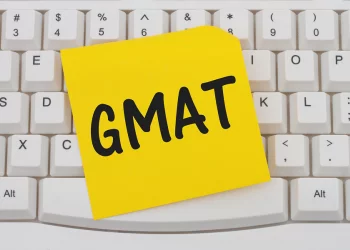
Are you thinking of taking this aptitude test for your business school application but are unsure of the GMAT schedule you need to follow? Find handy reminders below and use this step-by-step guide to make sure everything around the exam is taken care of on time.
#1. Know your school’s requirements
Before you start researching available options for taking the test, you first need to know if it is listed as a requirement by the universities on your list. You also need to have some idea of the score they want you to get. Many business schools don’t have a minimum score requirement because they assess applications on a case-by-case basis. Even so, it would be best if you have a target score range in mind so that you avoid any unpleasant surprises. If there is no minimum GMAT score listed by the program, it can help to check the average score of the current class which is usually pointed out in the class profile.
Remember that you need to be realistic about your abilities and potential on the exam. If you decide to target some of the most competitive business schools in the US Ivy League, for example, you should be confident in the application you submit and in your abilities to get a top GMAT result. You also need to be aware of the application deadlines and be sure that you have sufficient time to prepare and submit your score.
#2. Check test centers and logistics
Once you have an idea of the school requirements and the time frame, you can look into the logistics more closely. Is there an official GMAT test center in your city or will you have to travel to a nearby location? Are the testing dates you are planning for still available? Test takers with disabilities might have to factor in some additional planning. The bottom line is, every GMAT applicant should have a solid schedule prepared in advance.
In addition, professionals who have a full-time job will have to take their working hours into account. Try to plan taking time off work as soon as you know more about your testing arrangements so that you avoid last-minute stress.
Finally, there is always the financial aspect to consider. The price of sitting the GMAT ranges between USD 250 and USD 285, depending on your location and currency. In the UK, the cost is GBP 225. Next to the official fees and regulations that test takers are asked to follow, it is also important to plan for additional expenses such as attending preparation classes, hiring a GMAT tutor, or paying for travel arrangements if the test center is located in another city. Taking the exam can turn into a considerable financial investment but it is worth the price if it helps you gain admission, and even a scholarship, to the right study program for you.
#3. Register on time
Planning everything on time is so important that it deserves its own subheading. As mentioned earlier in the article, your GMAT test date has to be perfectly planned so that results are ready before your shortlisted schools close their application rounds.
You could also anticipate a plan B. If you are unhappy with your score, allow time for additional preparation and for retaking the GMAT. Try not to postpone registering for the exam and take care of the logistics early on.
Then, add the exam preparation to your schedule. How much practice would you need for the different GMAT sections and questions? Some test takers have strong verbal and writing skills but need to focus on their quantitative preparation. Others are already confident in their analytical thinking but might have to brush up on other aspects of the exam. Figuring out your current state of preparation will help you personalize your study plan week by week.
Check out: GMAT Prep: Calculate Your Exam Budget
#4. Practice, practice, practice
Why is GMAT preparation so important? As you have probably learned by now, the purpose of this exam is not to test the math knowledge or English proficiency of applicants. It doesn’t assess their awareness of business and management either. In fact, the GMAT has a specific structure, format, and time limitation which can catch you off guard if you haven’t completed any of the practice tests. Even test takers who are sufficiently confident in their quantitative and verbal skills should make time to familiarize themselves with the test structure. Successful test takers report up to 100 hours in preparation. While the intensity of their practice will differ, you should plan for at least three to four months for GMAT prep.
Get to know the four sections of the exam, the number of questions you can expect, and the time limit you will have for each section. When you arrive at the test center, you will be able to choose the order of the sections. There are two optional breaks during the GMAT.
Most importantly, keep in mind that the GMAT is computer-adaptive – “the difficulty of the test tailors itself in real-time to your ability level”. If this is the first time you hear the term, then you will definitely need to make more time for practice. The organization administering the GMAT also reminds test takers that they cannot “skip, return to, or change your answers to questions”.
#5. Be ready for test day
So, test day is finally here! Check that everything is arranged in terms of logistics and prepare to arrive at the test center some time in advance. You don’t want to be stuck in traffic or to be slowed down by other unexpected circumstances because even if you arrive on time, this might stress you out and break your concentration. The organization that owns the GMAT exam reminds applicants that there is a check-in process in the test center which means it is best to get there at least 30 minutes prior to your appointment.
Remember that food and drinks are not allowed during the exam unless pre-authorized in advance. Items such as your mobile phone, watch, dictionary, and calculator should also be safely stored in a locker at the test center. However, don’t forget to take your GMAT approved identification with you.
Check out: How to Master GMAT Timing
Hopefully, these guidelines will help you plan your GMAT schedule in detail. The rest is in your hands!


Comments